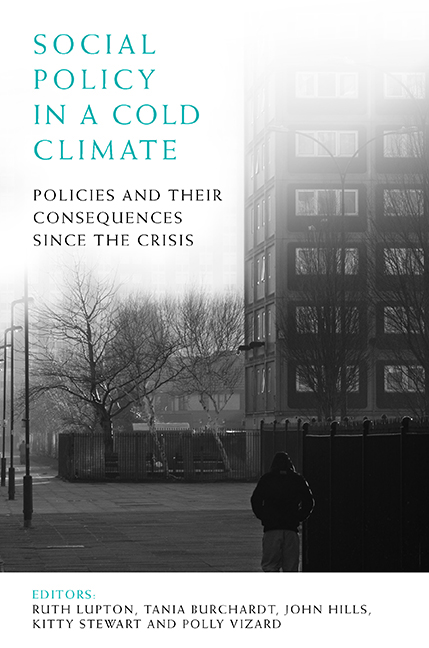Seven - Housing
Published online by Cambridge University Press: 01 September 2022
Summary
The situation on the eve of the crisis
Despite its importance, successive governments have always had an ambiguous and changing approach to addressing housing need and the housing market. Home ownership is the dominant and promoted tenure, and the voluntary sector plays a substantial role in all aspects of social housing provision. Furthermore, devolution and the privatisation of state housing activities have played a substantial role in moves to ‘roll back’ the state (see, for example, Harloe, 1995; Kemeny, 2001; Hodkinson and Robbins, 2013). Housing is also capital-intensive, which means that it is at particular risk of cuts in times of fiscal withdrawal.
Housing policy is devolved to the Scottish, Welsh and Northern Irish governments, although macroeconomic policy and benefits policy have, up to this point, been retained at UK level (Wong et al, 2011). This chapter focuses on the radical changes to English housing policy and expenditure since 2007.
The coalition's inheritance from the 1997-2010 Labour government
An assessment of English housing policy during 1975-2000, commissioned by the Department for Communities and Local Government (DCLG) (Stephens, 2005), noted that although housing quality improved and people had more choice, nevertheless, demand outstripped supply in many places, making private sector housing unaffordable for many. The rented and owner-occupied housing sectors were often separately concentrated in their own enclaves, and the market was unstable, with potential knock-on effects for the economy (Stephens et al, 2005). Under Labour, the government view was that ‘the housing market has structural problems’ (DETR, 2000, p 7).
For the 1997-2010 Labour governments, the position of housing within social policy was ambiguous at best. On the one hand, social housing was a key area for efforts to ‘roll back’ the state (continuing the Thatcher/Major governments’ policies of the Right to Buy for council housing and the transfer of council housing to housing associations). In addition, there was active government support for growth of home ownership, and latterly support for the private rented sector too (Hodkinson and Robbins, 2013). On the other hand, state intervention also enjoyed something of a revival under Labour. As in other policy areas, there was a dramatic growth in government expenditure on housing from 2001, peaking in 2009/10. From 1999, the Decent Homes programme set a new housing quality standard, and funding aimed to ensure all social housing reached the standard by 2010.
- Type
- Chapter
- Information
- Social Policy in a Cold ClimatePolicies and their Consequences since the Crisis, pp. 125 - 146Publisher: Bristol University PressPrint publication year: 2016

